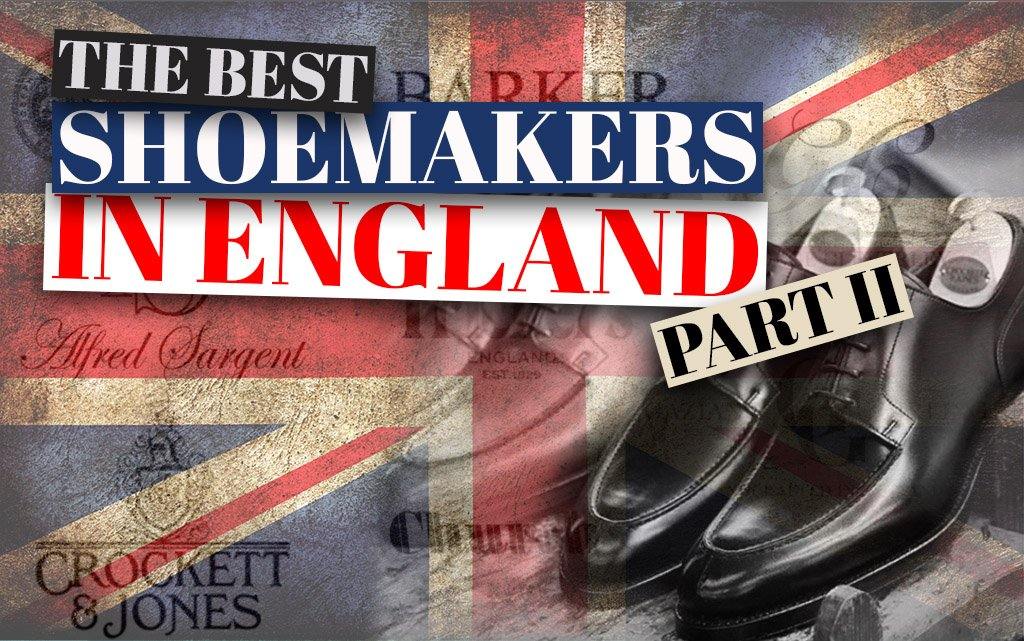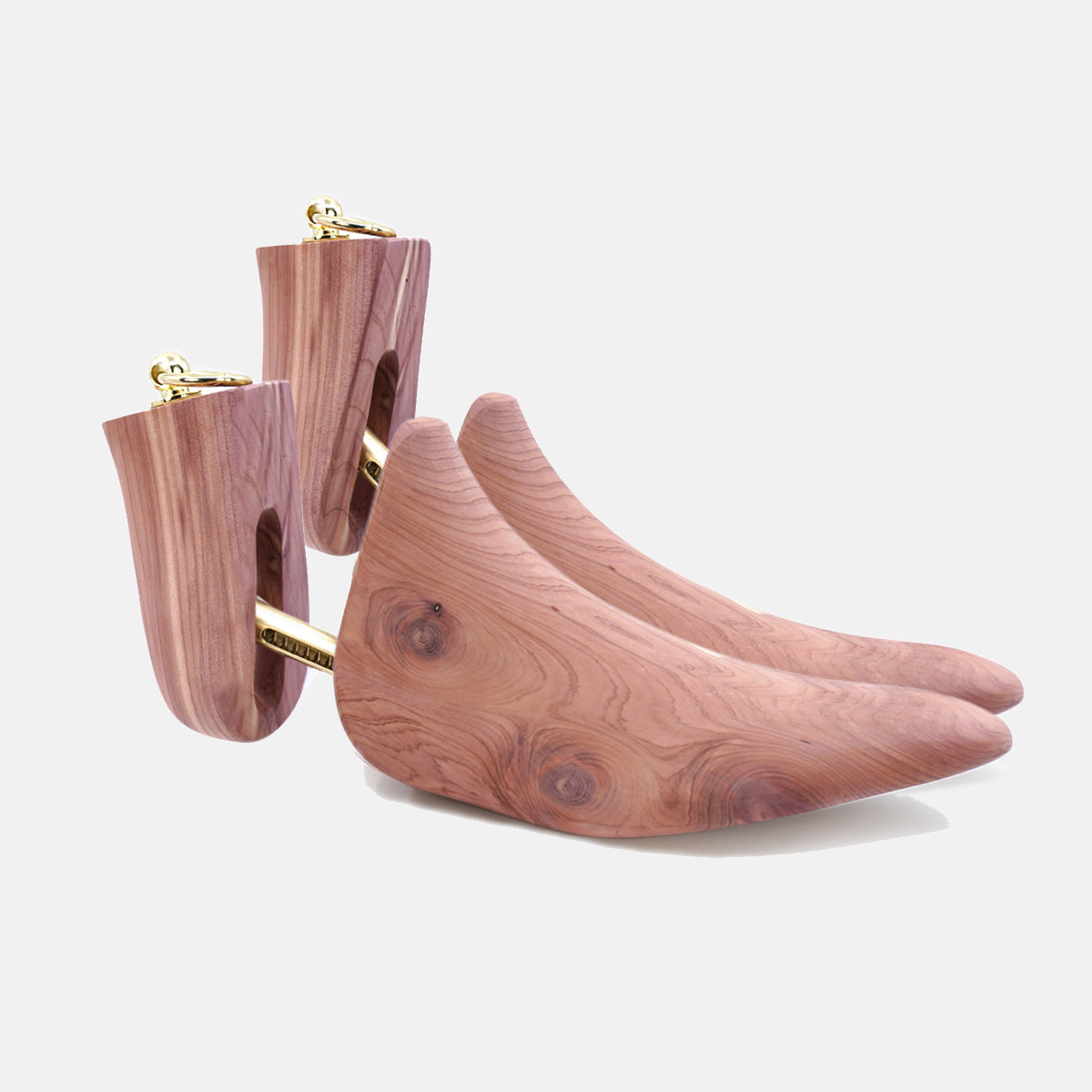Get 10% Off - Auto Applied At Checkout
Get 10% Off - Auto Applied At Checkout
Shoe Trees
shoe stretchers
Sets

The Best Shoemakers In England - Part II
June 09, 2021 6 min read
Now then, as an influx of dressed up cemented shoe brands continues to irk me and an old shoe restoration turns its petulant head from me as if I were an unsatisfactory and clumsy-thumbed lover, I must find something with which to (hopefully) wile you and (desperately) distract me from those sad looking shoes. So, here is Part II of the Best Shoemakers from England series. Our focus is on 'ready to wear,' but if bespoke is your boat, feel free to wax lyrical in the comments section below.
GAZIANO & GIRLING
History: The new kids on the block that woke up the sleepy, old Northampton Establishment. Tony Gaziano and Dean Girling learned the art of bootmaking on the floors of some of England’s most illustrious shoemakers. In 2006 they founded Gaziano & Girling, initially only making bespoke shoes. In 2013 they moved into their own factory in Kettering, Northamptonshire and expanded their offering to include 'ready to wear' shoes.
Interesting Fact: Tony Gaziano grew up in Northampton while Dean Girling came from a shoemaker family. They worked together for nearly 10 years at Edward Green – Tony the last maker/designer, Dean the Laster/sole maker – before they broke away and formed G&G.
What to expect: G&G shoes are distinctive by their refined, pinched waist, a feature mostly seen with bespoke shoes. G&G’s benchmade shoes are all cut from handcrafted lasts and made in G&G’s own factory. One will find the humble slipper to the most formal oxford and if you’re around Savile Row you may decide to use their MTO patina service.
Cost: Prices start from a meager $1,500 AUD.

L to R: Cambridge Blk Calf £820 | St James II £820 | Burnham Oak Calf £1,180 | Antibes Pine Calf £900
GEORGE CLEVERLEY
History: George Cleverley began working for a high-end London shoemaker after his service in World War One ended. George worked for this shoemaker for the next 39 years and in that time solidified his reputation as a master cordwainer. At the spritely age of 60, he started his own venture, G.J.Cleverley, located in Mayfair, London, where he worked right up to his death in 1991.
Interesting Fact: During World War One, George was stationed at the British boot factory in Calais, France. It appears that this left an indelible impression on the young soldier and set the course for his future success. Oh, and yes, the Cleverley shoes are worn by the Kingsmen of ‘Kingsman: The Secret Service,’ fame.
What to expect: The ‘Cleverley shape’ is synonymous with George Cleverley shoes, characterished by their signature chisel-toe. Cleverley offers a bespoke, semi-bespoke and a ready-to-wear collection (as well as their famous slipper collection).
Cost: Ready-to-wear starts from $900 AUD and available via Mr. Porter.

In no particular order: George Ocean Suede £495 | Porter Black Calf £495 Archie Tan Grain Calf £495 | David Walnut Suede £ Unavailable
GRENSON
History: Grenson has its beginnings in a small loft above a Corn Merchant in Rushden, Northampton in 1866. William Green grew his business over the next decade and moved out of the loft and into a factory where Green and Sons (Grenson) remained for over 100 years. Grenson was one of the first shoemakers to employ the Goodyear welt method into production – circa 1874.
Interesting fact: The G:Zero and G:One collections are made wholly in their Northampton factory. The G:Two collection is made in part in India. Grenson has also partnered with New Balance to offer the very popular Grenson x New Balance sneaker range.
What to expect: In the words of Grenson, they don’t want to be a ‘museum brand’. Today, Grenson has successfully morphed pedigree with contemporary and embraced fashion as a guiding characteristic of their shoe range. The G:Zero and G:One collections are comparable to Grenson’s now decommissioned, but much admired, Masterpiece and Rose collections. Their signature Brogue Boots (aka Fred Boots) is a favourite to many with its signature brouging, build quality and last.
Cost: From approx. $390AUD to $900AUD

L to R: G:0 - 0004-02 £515 | G:2 - Leander £225 | G:1 - Albert £420 | Fred - Grain Calf £460
LOAKES
History: In 1880 three brothers, Thomas, John and William set up a small business, making shoes out of Thomas’ home. By 1894, they had expanded into a 20,000 sq ft factory, which the Loake family still use today to make their premium line of shoes.
Interesting fact: Only their premium 1880 and Shoemaker collections are still made in Loake’s Kettering factory. The Design and L1 collections are made in India, while their Lifestyle collection comes from Italy, India, and Portugal. Most Loake Uppers, including from their 1880 collection, are stitched together in India. To their credit, they’ve been very open about this, much more so than other shoe manufacturers.
What to expect: The Loake 1880s are without a doubt the best quality shoes within the Loake offering and many shoe enthusiasts will compare them with Alan Edmonds in terms of quality. The L1 collection is their budget line and uses corrected grain. My advice would be to save your coin and go for the 1880 range. This author owns several pairs of their Sahara chukkas from their lifestyle range and is one of his go-to casual boots. Many of their dress shoes also cater for wide (G fitting) feet.
Cost: From $329 (Australian website)

L to R: 1880 Buckingham $479 | Shoemaker - Archway $449 | Lifestyle - Sahara $259 | L1 - Loafer 256 $345
TRICKERS
History: One of the oldest, continually running shoemakers in Northampton. Established in 1829, the shoemaker has earnt a reputation for exceptional quality. Their focus on heavy country boots and shoes has earnt the loyal following of many-an estate owner and the landed gentry.
Interesting fact: A favourite shoemaker of Prince Charles, Trickers was granted an official Royal Warrant in the 1980s
What to expect: Tricker’s is best known for their country boots and brogues and are a go-to for that country gentlemen look. More rugged than refined, their brouging is slightly larger than normal, as is the stitching. Their unique welting system creates excellent waterproof protection and in-part explains why they are so popular with the green-thumbed aristocracy.
Cost: From about $650AUD

Matlock Derby £395 | Stow Boot £425 | Mayfair M'Strap £375 | Richmond £395
HONOURABLE MENTION
What constitutes 'best' is always subjective. To counter contention for my spurious omission of a favourite shoemaker, or the like, I humbly present to you a list of fine British shoemakers and conveyors who, at the very least, deserve an honourable mention.
FOSTER & SON
Established in 1840. Foster & Son's natural calling is bespoke footwear. Although, they do offer a limited Ready to Wear offering, which are welt constructed and made to the specifications of their bespoke shoes.
HERRING
Not technically a shoemaker, they contract their shoe production to many of the shoemakers listed within this series. Notwithstanding, the Herring web store is arguably the best place online to find quality, fair priced, welted shoes.
JOHN LOBB
Established in 1849. Now owned by Hermes - except for the St. James' Street store, owned and operated by the Lobb family - John Lobb still uses Northampton craftsmanship and labour to make their handsome Ready to Wear range.
SANDERS & SANDERS LTD.
Established 1873. Sanders produce some very affordable welted shoes and half their production is made for other labels, particularly from the U.S. and Japan. There is an obvious military heritage to many of their shoe designs.
SOLOVAIR
Established 1881. Many have compared Solovair boots to Dr Martin's. That makes sense, since Solovair invented the Airwair sole and used to make Dr Martin boots (and still make several models). They also produce Goodyear welted and heat welted shoes.
TIM LITTLE
Tim Little quite his job in 1997 and opened the Tim Little shoe shop in Chelsea, London. All shoes are designed by him and made in England. In his spare time, he is the owner and Creative Director of Grensons.
WILDSMITH
Established in 1847. Wildsmith has had a rollercoaster start to the new century, but in 2017 it was acquired by Herring, who has lit a spark and is moving Wildsmith and their offering in an exciting direction.
Got a 'go-to' English shoemaker? Let us know in the comments section below and give us your recommendation.
Subscribe
Sign up to get the latest on sales, new releases and more …











